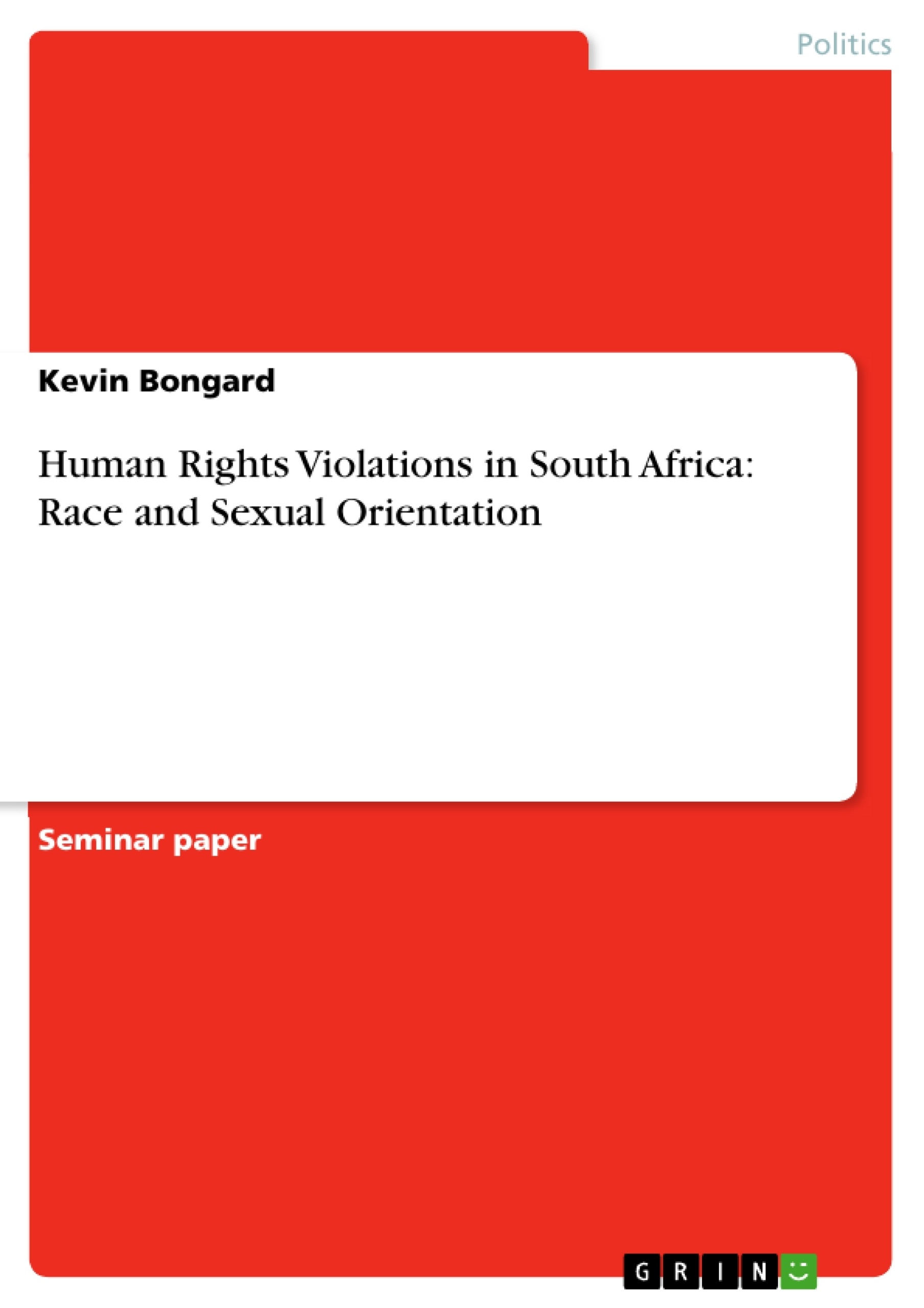All over the world, in every country, and every second, human rights are violated. There are countries where the situation is not as bad compared to others, which may be why people there assume that there are no human rights violations, but unfortunately, they can be found anywhere. One could choose any country in the world and focus on its human rights violations; it is always possible to find a shocking amount of information regardless of the country. In this seminar paper, I want to elucidate the human rights violations in a country that some people might not necessarily consider a negative example: South Africa. However, one of the fundamental problems with South Africa is that, to this day, the country has been unable to successfully fight its problems. These problems are numerous and cannot be fully explained in this short seminar paper, but it is important to have an overview of the whole situation, which is why I must recommend that people inform themselves about the ongoing situation and developments. In this paper, a quick overview shall be given of two very important issues in South Africa: race and sexual orientation. As everybody can imagine, South Africa’s situation today is still highly influenced by its past. The country struggles to reach racial reconciliation of its black and white people long after the Apartheid. The situation for LGBTQ (lesbian, gay, bisexual, transgender and queer) people is equally difficult since there is still a high proportion of South Africans who do not accept them and sometimes even violate their human rights in horrible and unimaginable ways. It is even more shocking to hear about these issues considering that South Africa has had a Constitution since the 1990s that should largely prevent discrimination and inequality. Section 9 of the Constitution’s Bill of Rights explicitly addresses the issues of race and sexual orientation, but, based on the ongoing, unresolved conflicts, its power is, in practice, limited. What are the reasons for all these human rights violations in South Africa? This paper was written in the context of the seminar “Human Rights Violations in Literature, Popular and Digital Cultures” of the Johannes Gutenberg University Mainz. In said seminar, we learned a lot about human rights violations all over the world, including those in countries where one would not expect them.
Inhaltsverzeichnis (Table of Contents)
- Introduction
- Race Issues
- Sexual Orientation Issues
- J. M. Coetzee's Disgrace
- Conclusion.
Zielsetzung und Themenschwerpunkte (Objectives and Key Themes)
This seminar paper aims to shed light on the human rights violations in South Africa, specifically focusing on the issues of race and sexual orientation. While South Africa has a Constitution designed to prevent discrimination and inequality, these issues remain prevalent. The paper explores the lasting impact of apartheid on racial relations and the challenges faced by LGBTQ individuals in a country grappling with its past.
- The enduring legacy of apartheid and its impact on racial relations in South Africa.
- The persistence of human rights violations against LGBTQ individuals in South Africa.
- The complexities of achieving racial and social justice in a post-apartheid society.
- The role of literature, particularly J. M. Coetzee's Disgrace, in exposing and analyzing the realities of human rights violations in South Africa.
- The need for continued awareness and efforts to address the ongoing human rights challenges in South Africa.
Zusammenfassung der Kapitel (Chapter Summaries)
- Introduction: This chapter provides an overview of the seminar paper's focus on human rights violations in South Africa, particularly those related to race and sexual orientation. It highlights the challenges of achieving reconciliation in a country deeply marked by its past, emphasizing the need for ongoing awareness and understanding of these issues.
- Race Issues: This chapter examines the legacy of apartheid and its continued influence on racial inequality in South Africa. It traces the historical roots of apartheid and its impact on the lives of black South Africans, exploring the ongoing struggles for racial justice and the complexities of achieving racial reconciliation.
- Sexual Orientation Issues: This chapter focuses on the human rights violations faced by LGBTQ individuals in South Africa. It discusses the challenges of acceptance and equality, highlighting the discrimination and abuse that many LGBTQ people continue to endure despite constitutional protections.
Schlüsselwörter (Keywords)
This seminar paper explores key issues such as human rights violations, race, sexual orientation, apartheid, South Africa, racial reconciliation, LGBTQ rights, discrimination, and inequality. It draws on the work of J. M. Coetzee's Disgrace as a literary example to analyze the complexities of these issues in a post-apartheid context.
- Quote paper
- Kevin Bongard (Author), 2018, Human Rights Violations in South Africa: Race and Sexual Orientation, Munich, GRIN Verlag, https://www.grin.com/document/442657




